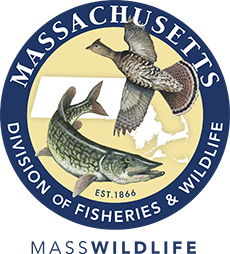- Division of Fisheries and Wildlife
Media Contact for MassWildlife Habitat Management Grants awarded
Media Contact, MassWildlife

Two municipalities and five conservation organizations were awarded a total of $365,000 for habitat management projects to improve habitat for rare or declining populations of wildlife. The grants are provided through MassWildlife’s Habitat Management Grant Program and will fund wildlife habitat improvement projects on 234 acres.
MassWildlife’s Habitat Management Grant Program (MHMGP) provides crucial financial assistance to private and municipal owners of conserved lands to improve habitat for wildlife, steward biodiversity, enhance climate resiliency, and promote public recreational opportunities. Since 2015, MassWildlife has funded 112 projects that have restored over four thousand acres of natural habitat.
“Partnership and collaboration will be essential for meeting our ambitious biodiversity and climate goals. Most forests and other wildlife habitats in Massachusetts are not state-owned, and we rely on conservation organizations, cities and towns, private landowners, and other partners to greatly expand our impact,” said Department of Fish and Game Commissioner Tom O’Shea. “This program provides us with the unique opportunity to not only directly benefit threatened species, but also create new outdoor recreation opportunities and support the sporting community.”
While MassWildlife and other conservation organizations have made substantial investments in land conservation within Massachusetts, many essential habitats are degraded, and vulnerable species face increasing threats from climate change. To address these challenges, the Healey-Driscoll Administration is investing in habitat management efforts on state wildlife lands and, through MHMGP, on all conserved lands across the state alongside private and municipal partners. Habitat restoration and management activities will create healthy, resilient landscapes that support a variety of species, particularly those of greatest conservation need.
“MassWildlife’s Habitat Management Grant Program builds on success of ongoing efforts to advance our mission of preserving the great diversity and abundance of wildlife, plants, and habitats in Massachusetts,” said Mark S. Tisa, MassWildlife Director. “Public and private investment in habitat management is critical for promoting ecological resiliency and biodiversity, and we are thrilled to work with this year’s grant recipients as they commit to improving landscapes for people and nature.”
The following seven projects will receive MassWildlife Habitat Management Grants:
- Falmouth – The Town of Falmouth has been awarded $70,000 to improve sandplain grasslands by removing invasive vines, woody shrubs, plants, and trees. This project will also improve the connectivity of these parcels to upland forest habitats at Coonamessett Reservation, which will expand and improve rare species habitat.
- Great Barrington – The Berkshire Natural Resources Council has been awarded $28,930 to treat invasive plant species on Housatonic River floodplain forest and a wooded oxbow at the Rising Pond Conservation Area.
- Kingston – The Town of Kingston has been awarded $23,765 to treat the invasive aquatic plant species, variable‐leaved milfoil, at Smelt Pond. This aggressive non-native species outcompetes native aquatic species and reduces water quality.
- Nantucket – The Nantucket Conservation Foundation has been awarded $75,000 to help protect pitch pine barren habitat at Ram Pasture. This funding will cover the removal, chipping, and safe disposal of southern pine beetle-infected pitch pine.
- Nantucket – The Nantucket Island Land Bank has been awarded $74,700 to help restore pine barrens at Gardner Farm. Areas of dense pitch pine forest that are most susceptible to southern pine beetle outbreaks will be thinned to promote site resiliency and a heathland / sandplain-grassland understory, both of which are beneficial to numerous rare moths and butterflies.
- South Lee – South Lee Associates has been awarded $17,990 to treat invasive species along the Housatonic River to improve floodplain forest and early successional grasslands that are being overgrown with woody species.
- Tisbury – The Sheriff’s Meadow Foundation has been awarded $75,000 to manage southern pine beetle-infested pitch pine and pitch pine/oak forest at Phillips Preserve. This expansion of a sanitation harvest is aimed at combating the spread of southern pine beetle, a southern species that has been expanding its range north, threatening our pitch pine forests.
